The Green Fields Of France (No Man's Land)

CROATO / CROATIAN
Versione croata / Croatian version / Version croate / Kroatiankielinen versio:
Beekeeper (L. Trans.)
Versione croata / Croatian version / Version croate / Kroatiankielinen versio:
Beekeeper (L. Trans.)
Zelena polja Francuske
(continua)
(continua)
inviata da L'Anonimo Toscano del XXI Secolo 23/11/2024 - 18:28
Bella Ciao
anonimo
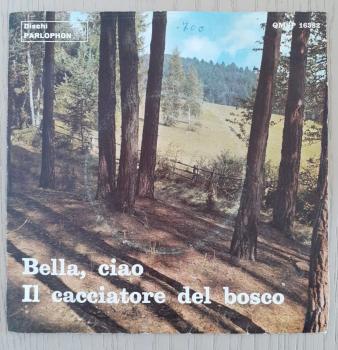
CROATO / CROAT 3
Bella ciao (Versione croata di Mario Kinel e Mirko Cetinski) [1970]
Bella ciao (Croatian version by Mario Kinel and Mirko Cetinski) [1970]
Di Mirko Cetinski si trova quasi tutto in rete, tranne che una biografia sia pur sommaria. La abbiamo quindi un po’...ricostruita. Mirko Cetinski è (o era) sicuramente istriano di Rovigno (Rovinj), città alla quale ha dedicato sia una canzone in dialetto veneto (“Nato a Rovigno”), sia una in croato (“Pjesma Rovinju”, cioè “Canzone a Rovigno”). Da buon istriano doveva essere perfettamente trilingue (croato, italiano e, appunto, veneto). Da quel che si trova in rete, dev’essere stato un autore e interprete parecchio prolifico. A parte le sue canzoni in croato, era specialista in “cover” di canzoni italiane che, non di rado, interpretava anche in italiano. Nel 1970 fa uscire un 45 giri per la casa discografica Jugoton (SY-1545 Studio... (continua)
Bella ciao (Versione croata di Mario Kinel e Mirko Cetinski) [1970]
Bella ciao (Croatian version by Mario Kinel and Mirko Cetinski) [1970]
Di Mirko Cetinski si trova quasi tutto in rete, tranne che una biografia sia pur sommaria. La abbiamo quindi un po’...ricostruita. Mirko Cetinski è (o era) sicuramente istriano di Rovigno (Rovinj), città alla quale ha dedicato sia una canzone in dialetto veneto (“Nato a Rovigno”), sia una in croato (“Pjesma Rovinju”, cioè “Canzone a Rovigno”). Da buon istriano doveva essere perfettamente trilingue (croato, italiano e, appunto, veneto). Da quel che si trova in rete, dev’essere stato un autore e interprete parecchio prolifico. A parte le sue canzoni in croato, era specialista in “cover” di canzoni italiane che, non di rado, interpretava anche in italiano. Nel 1970 fa uscire un 45 giri per la casa discografica Jugoton (SY-1545 Studio... (continua)
Većeras idem, jer moram poći, [1]
(continua)
(continua)
inviata da Riccardo Venturi 21/11/2024 - 20:03
Bella Ciao
anonimo

CROATO / CROAT 2
Bela ćao (Traduzione croata tratta da hr.wikipedia)
Bela ćao (Croatian translation from hr.wikipedia)
Bella ciao poznata je talijanska antifašistička pjesma iz Drugoga svjetskog rata posvećena talijanskim partizanima koji su se borili protiv okupacije nacističke Njemačke. Pjesma je nastala još krajem 19. stoljeća, kada su je pjevale radnice na rižinim poljima u sjevernoj Italiji. Tijekom Drugog svjetskog rata talijanski partizani pjesmu su preuzeli u borbi protiv njemačkoga okupatora i talijanskih fašista te se i danas često pjeva kao protestna pjesma koja simbolizira otpor i želju za slobodom.
Traduzione pressoché letterale del testo italiano partigiano. La si ritrova (con qualche lievissima differenza, forse "bosniaca") anche su questa pagina di Radio Sarajevo, nella quale è la "Pjesma dana" (canzone del giorno) dell'8 maggio 2023:
Pjesma dana i "Bella Ciao": Simbol... (continua)
Bela ćao (Traduzione croata tratta da hr.wikipedia)
Bela ćao (Croatian translation from hr.wikipedia)
Bella ciao poznata je talijanska antifašistička pjesma iz Drugoga svjetskog rata posvećena talijanskim partizanima koji su se borili protiv okupacije nacističke Njemačke. Pjesma je nastala još krajem 19. stoljeća, kada su je pjevale radnice na rižinim poljima u sjevernoj Italiji. Tijekom Drugog svjetskog rata talijanski partizani pjesmu su preuzeli u borbi protiv njemačkoga okupatora i talijanskih fašista te se i danas često pjeva kao protestna pjesma koja simbolizira otpor i želju za slobodom.
Traduzione pressoché letterale del testo italiano partigiano. La si ritrova (con qualche lievissima differenza, forse "bosniaca") anche su questa pagina di Radio Sarajevo, nella quale è la "Pjesma dana" (canzone del giorno) dell'8 maggio 2023:
Pjesma dana i "Bella Ciao": Simbol... (continua)
Jednog dana, kad se probudih,
(continua)
(continua)
inviata da L'Anonimo Toscano del XXI Secolo 19/11/2024 - 10:08
1947

Pjesma bez osvete i zavisti, jednostavno ogledalo jednog dramatičnog i tužnog ljudskog iskustva.
Il traduttore giustamente sottolinea che si tratta di una canzone senza recriminazioni né vendette, solo lo specchio di una drammatica e triste vicenda umana.
1947
(continua)
(continua)
11/2/2024 - 19:54
The Pogues & Kirsty MacColl: Fairytale of New York

BAJKA IZ NEW YORKA
(continua)
(continua)
inviata da Dq82 3/1/2024 - 17:38
Mama ŠČ!

(2023)
In interviews with Jutarnji list, the band reported that the song title had been inspired by the "first letter of the oldest alphabet in the world", "ŠČ". The song, according to the band, is an anti-war song; in the interview, the band reported that after total Armageddon has been waged on Earth, a rocket would land on Earth, containing the letters "ŠČ".
In other interviews, the band has also claimed that "ŠČ" could also mean the sound someone makes when somebody orgasms, a blood type, or a sound someone makes when they are meditating. It is also reference to the Russian letter Shcha (Щ).
In further interviews with the Croatian newsite Pressing, the band claimed that the song was a metaphor for the Russian Federation. The band claims that in the song, they mock dictators for being "childish", with an emphasis on the Russian president Vladimir Putin and his decision to launch the... (continua)
In interviews with Jutarnji list, the band reported that the song title had been inspired by the "first letter of the oldest alphabet in the world", "ŠČ". The song, according to the band, is an anti-war song; in the interview, the band reported that after total Armageddon has been waged on Earth, a rocket would land on Earth, containing the letters "ŠČ".
In other interviews, the band has also claimed that "ŠČ" could also mean the sound someone makes when somebody orgasms, a blood type, or a sound someone makes when they are meditating. It is also reference to the Russian letter Shcha (Щ).
In further interviews with the Croatian newsite Pressing, the band claimed that the song was a metaphor for the Russian Federation. The band claims that in the song, they mock dictators for being "childish", with an emphasis on the Russian president Vladimir Putin and his decision to launch the... (continua)
Mama kupila traktora
(continua)
(continua)
25/2/2023 - 18:30
Percorsi:
Guerre in Ucraina
Volver a los diecisiete

Anzhelitochka (Angela) (L. Trans.)
Vratiti se sedamnaestoj godini
(continua)
(continua)
inviata da Riccardo Venturi 15/11/2021 - 12:26
Lo que más quiero

treeoftoday244 (Mirela) (L. Trans.)
Ono što najviše volim
(continua)
(continua)
inviata da Riccardo Venturi 14/11/2021 - 09:54
Când o fi la moartea mea
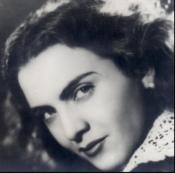
d'après:
https://lyricstranslate.com
https://lyricstranslate.com
KADA DOĐE MOJA SMRT
(continua)
(continua)
inviata da Ed 6/10/2021 - 14:53
Warszawianka 1905 roku [Варшавянка; La Varsovienne; ¡A las barricadas!]
![Warszawianka 1905 roku [Варшавянка; La Varsovienne; ¡A las barricadas!]](img/upl/karakash.jpg)
1q1. Varšavjanka - La versione jugoslava (serbocroata) di Branko Karakaš
1q1. Varšavjanka - The Yugoslav (Serbo-Croatian) version by Branko Karakaš
Nota. Il nome del traduttore è stato ripreso da qui.
Note. The translator's name is stated here.
Branko Karakaš (????-2014) is a Macedonian composer, musicologist, poet, director, music critic and translator of Croatian origin. Born in Laki, Macedonia, he died in Vienna, Austria, where he spent the last 24 years of his life.
Karakaš formed his education in all the countries of the former Yugoslavia, and began his career as a member of “the Children's Orchestra of the Zagreb Opera”, also continued as a trumpet and violin performer in the Military Orchestra in Skopje, and he was a composer and music illustrator at the Drama Theater, and a permanent music critic in "Nova Makedonija".
Karakaš headed the Belgrade Department of Music Propaganda... (continua)
1q1. Varšavjanka - The Yugoslav (Serbo-Croatian) version by Branko Karakaš
Nota. Il nome del traduttore è stato ripreso da qui.
Note. The translator's name is stated here.
Branko Karakaš (????-2014) is a Macedonian composer, musicologist, poet, director, music critic and translator of Croatian origin. Born in Laki, Macedonia, he died in Vienna, Austria, where he spent the last 24 years of his life.
Karakaš formed his education in all the countries of the former Yugoslavia, and began his career as a member of “the Children's Orchestra of the Zagreb Opera”, also continued as a trumpet and violin performer in the Military Orchestra in Skopje, and he was a composer and music illustrator at the Drama Theater, and a permanent music critic in "Nova Makedonija".
Karakaš headed the Belgrade Department of Music Propaganda... (continua)
Varšavjanka
(continua)
(continua)
inviata da Борец(╹◡╹) 9/7/2021 - 07:45
Geordie, or My Geordie Will Be Hanged In A Golden Chain
anonimo

MajorCampos (L. Trans.)
Geordie
(continua)
(continua)
inviata da Riccardo Venturi 23/1/2021 - 09:09
Carl Sagan: Pale Blue Dot

Blijeda plava točka
(continua)
(continua)
inviata da Riccardo Venturi 21/12/2020 - 00:00
Balkan 90tih
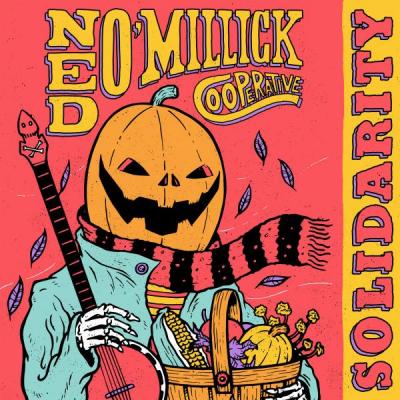
2020
Solidarity
Solidarity
Pjesnik je napisao svoj posljednji stih
(continua)
(continua)
inviata da Dq82 26/11/2020 - 09:49
Percorsi:
Guerre nei Balcani negli anni '90
Chacun de vous est concerné [incl. Canzone del maggio di Fabrizio De André]
![Chacun de vous est concerné [incl. <em>Canzone del maggio</em> di Fabrizio De André]](img/thumb/c3706_130x140.jpeg?1328479274)
MajorCampos (L. Trans.)
Pjesma Maja
(continua)
(continua)
inviata da Riccardo Venturi in isolamento 6/11/2020 - 21:48
Fabrizio De André: Amico fragile

MajorCampos (L. Trans.)
Prijatelju lomljivi
(continua)
(continua)
inviata da L'Anonimo Toscano del XXI Secolo 12/10/2020 - 11:08
Preghiera in gennaio
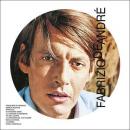
Mate (MajorCampos) (L. Trans. 2016)
"Pjesma je posvećena talijanskom kantautoru Luigiu Tencu koji je 1967. počinio samoubojstvo za vrijeme festivala u San Remu."
Siječanjska molitva
(continua)
(continua)
inviata da L'Anonimo Toscano del XXI secolo 23/5/2020 - 06:20
Canto del servo pastore

MajorCampos (L. Trans.)
PJESMA O USAMLJENOM PASTIRU
(continua)
(continua)
inviata da Riccardo Venturi 26/8/2019 - 21:10
Апрель
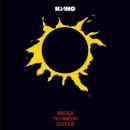
Anzhelitochka (L. Trans.) 05-02-2013
TRAVANJ
(continua)
(continua)
inviata da CCG/AWS Staff 14/5/2019 - 11:10
Georges Brassens: Les passantes
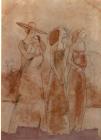
MajorCampos (L. Trans.)
PROLAZNICE
(continua)
(continua)
inviata da L'Anonimo Toscano del XXI secolo 18/4/2019 - 23:51
Nek nas sete
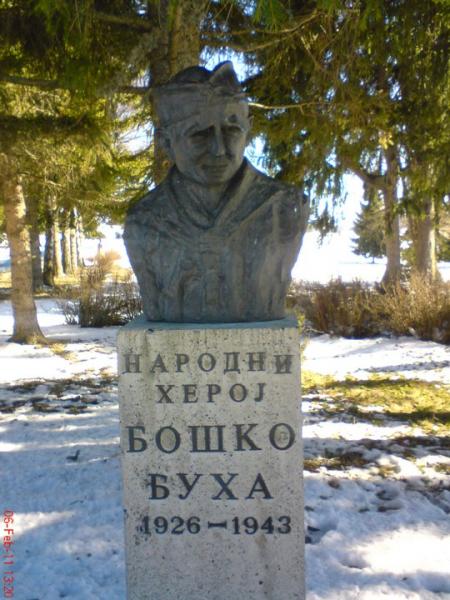
(1978)
Tekst/Testo: Dušan Radović
Muzika/Musica: Zoran Simjanović
Izvođač/Interprete: Oliver Dragojević
dalla colonna sonora del film Boško Buha di Branko Bauer
La storia di Boško Buha, partigiano di soli diciassette anni ucciso dai cetnici durante un'imboscata nel 1943.
Tekst/Testo: Dušan Radović
Muzika/Musica: Zoran Simjanović
Izvođač/Interprete: Oliver Dragojević
dalla colonna sonora del film Boško Buha di Branko Bauer
La storia di Boško Buha, partigiano di soli diciassette anni ucciso dai cetnici durante un'imboscata nel 1943.
Čuli su od oca
(continua)
(continua)
27/1/2019 - 15:31
L'Internationale

CROATO [2] / CROAT [2]
La versione dell'Internazionale comunemente cantata in Serbocroato nella Repubblica Socialista Federativa di Jugoslavia consisteva della sola strofa iniziale e del ritornello; si tratta, palesemente, di una traduzione della versione russa. La versione era stata preparata su ordine del Partito Comunista Jugoslavo (poi diventato la “Lega dei Comunisti”) ed imposta come ufficiale; come tale, intendeva riflettere le caratteristiche linguistiche comuni e unificate delle di ciò che allora venivano considerate le due “varianti” del sistema linguistico serbocroato.
The version of the Internationale commonly sung in Serbocroat in the Federal Socialist Republic of Yugoslavia only consisted of the first verse plus refrain; it is evidently a translation from the Russian version. The version was ordered by the Communist Party of Yugoslavia (later renamed “League of Communists”)... (continua)
La versione dell'Internazionale comunemente cantata in Serbocroato nella Repubblica Socialista Federativa di Jugoslavia consisteva della sola strofa iniziale e del ritornello; si tratta, palesemente, di una traduzione della versione russa. La versione era stata preparata su ordine del Partito Comunista Jugoslavo (poi diventato la “Lega dei Comunisti”) ed imposta come ufficiale; come tale, intendeva riflettere le caratteristiche linguistiche comuni e unificate delle di ciò che allora venivano considerate le due “varianti” del sistema linguistico serbocroato.
The version of the Internationale commonly sung in Serbocroat in the Federal Socialist Republic of Yugoslavia only consisted of the first verse plus refrain; it is evidently a translation from the Russian version. The version was ordered by the Communist Party of Yugoslavia (later renamed “League of Communists”)... (continua)
INTERNACIONALA
(continua)
(continua)
inviata da Riccardo Venturi 26/4/2018 - 10:26
Ratni profiteri
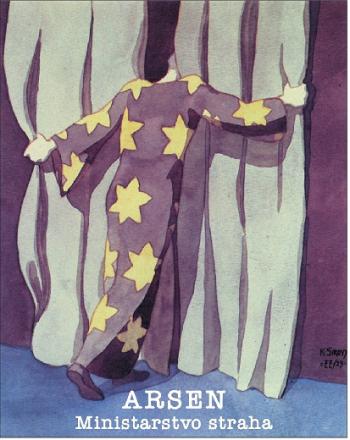
dall'album Ministarstvo straha ("Ministero della paura") del 1997
Dolaze ratni profiteri,
(continua)
(continua)
inviata da Monia 22/2/2018 - 23:19
Percorsi:
Guerre nei Balcani negli anni '90
נרקוד לשלום

12. CROATO / Croatian
Franci Buljat
Franci Buljat
PLESAT ĆEMO ZA MIR
(continua)
(continua)
inviata da Riccardo Venturi 25/8/2017 - 21:00
Green, Green Grass of Home

ZELENA, ZELENA TRAVA MOG DOMA
(continua)
(continua)
inviata da Dq82 1/12/2016 - 21:24
Blowin' in the Wind

CROATO / CROAT [Lada Bučić / Matt Collins i ansambl Crveni Koralji]
Matt Collins and Crveni Koralji
Koliko Dugo (Blowing in the Wind)
Peggy Sue
Jugoton 1964
Matt Collins and Crveni Koralji
Koliko Dugo (Blowing in the Wind)
Peggy Sue
Jugoton 1964
KOLIKO DUGO
(continua)
(continua)
inviata da Dq82 19/10/2016 - 11:29
E, moj druže beogradski
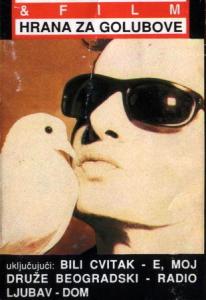
(1992)
dall'album "Hrana za golubove" (Cibo per colombe) della rock band croata "Film"
Musica scritta originariamente per Na morskome plavom zalu tratta dal film "Do You Remember Dolly Bell" di Kusturica.
dall'album "Hrana za golubove" (Cibo per colombe) della rock band croata "Film"
Musica scritta originariamente per Na morskome plavom zalu tratta dal film "Do You Remember Dolly Bell" di Kusturica.
Lijepe cure beogradske
(continua)
(continua)
inviata da Monia 18/3/2016 - 12:58
Percorsi:
Guerre nei Balcani negli anni '90
Gracias a la vida
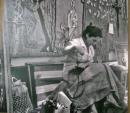
CROATO / CROATIAN / CROATA
La traduzione croata ripresa da Mojnet appare pienamente cantabile e di fattura artistica; ma non ne è indicato l'autore, né le ricerche hanno dato finora alcun frutto. La versione si fa notare per l'inversione dei sessi rispetto all'originale spagnolo (segno che dev'essere cantata da un uomo): p.es., “l'uomo che amo” diventa “la donna che amo”. E' l'unico caso del genere finora reperito.
The Croatian translation reproduced from Mojnet looks fully singable and of artistic workmanship; but the author is not stated, and up to now all researches proved vain. The version is noteworthy for another feature, that is sex inversion compared with the Spanish original (a token it must be sung by a man): e.g., “the man I love” becomes “the woman I love”. This is a unique case. [CCG/AWS Staff]
The Croatian translation reproduced from Mojnet looks fully singable and of artistic workmanship; but the author is not stated, and up to now all researches proved vain. The version is noteworthy for another feature, that is sex inversion compared with the Spanish original (a token it must be sung by a man): e.g., “the man I love” becomes “the woman I love”. This is a unique case. [CCG/AWS Staff]
HVALA ŽIVOTE
(continua)
(continua)
inviata da Riccardo Venturi 6/5/2015 - 02:33
Jama
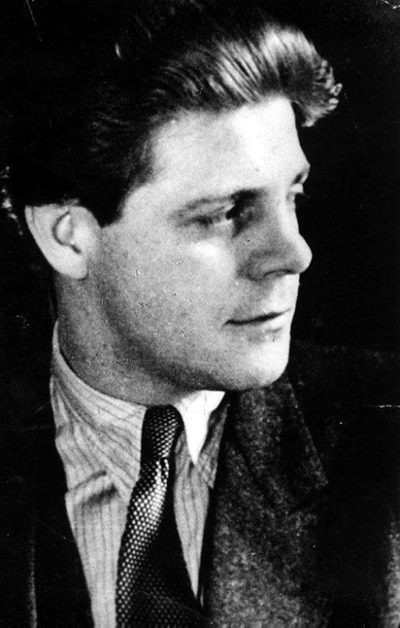
[1942-43]
Versi del poeta croato Ivan “Goran” Kovačić (1913-1943)
Interpretati da Dubravka Ostojić, Mirko Švec, Vili Matula e Zvonko Novosel su base musicale di Davor Rocco (compositore e produttore musicale croato) nel disco intitolato “Jama”, pubblicato dalla yugoslava Jugoton nel 1989
Ivan “Goran” Kovačić era del villaggio croato di Lukovdol, nella regione montuosa del Gorski Kotar. Il suo soprannome Goran credo corrisponda al nostro “montagnino”, uomo che viene dai monti. Studiò a Karlovac e Zagabria. Cominciò a scrivere poesie, novelle e saggi fin dal 1929 e dal 1936 esercitò la professione di giornalista.
Antifascista, di madre ebrea, nell’inverno del 1942 decise di unirsi ai partigiani di Tito, benchè la sua salute fosse già compromessa dalla tubercolosi.
Come si sa, la guerra nei Balcani è sempre stata una faccenda incasinata… Anche allora gli attori in campo erano molti, e... (continua)
Versi del poeta croato Ivan “Goran” Kovačić (1913-1943)
Interpretati da Dubravka Ostojić, Mirko Švec, Vili Matula e Zvonko Novosel su base musicale di Davor Rocco (compositore e produttore musicale croato) nel disco intitolato “Jama”, pubblicato dalla yugoslava Jugoton nel 1989
Ivan “Goran” Kovačić era del villaggio croato di Lukovdol, nella regione montuosa del Gorski Kotar. Il suo soprannome Goran credo corrisponda al nostro “montagnino”, uomo che viene dai monti. Studiò a Karlovac e Zagabria. Cominciò a scrivere poesie, novelle e saggi fin dal 1929 e dal 1936 esercitò la professione di giornalista.
Antifascista, di madre ebrea, nell’inverno del 1942 decise di unirsi ai partigiani di Tito, benchè la sua salute fosse già compromessa dalla tubercolosi.
Come si sa, la guerra nei Balcani è sempre stata una faccenda incasinata… Anche allora gli attori in campo erano molti, e... (continua)
I.
(continua)
(continua)
inviata da Bernart Bartleby 12/2/2015 - 15:18
Where Have all the Flowers Gone

CROATO / CROATIAN / CROATE [3]
Forum "Pollitika"
La seguente versione croata, come ci informa il suo contributore Veljko, è stata usata nel forum “Pollitika” (sito croato di discussione politica) in un commento all'indomani del massacro neonazista ucraino di Odessa del 2 maggio 2014. Una canzone di pace, come si dice nel forum, usata “contro la propaganda e la violenza”. La versione della canzone in lingua croata si segnala per la sua aderenza al testo originale inglese; riportiamo qui anche l'intero commento in lingua croata.
The following Croatian version, as specified by its contributor Veljko, was used in the “Pollitika” forum (a Croatian political discussion forum), in a commentary in the aftermath of the Neo-Nazi Odessa massacre of May 2, 2014. A peace song, as it is stated in the forum, used “against propaganda and violence”. The Croatian version of the song is remarkable for being... (continua)
Forum "Pollitika"
La seguente versione croata, come ci informa il suo contributore Veljko, è stata usata nel forum “Pollitika” (sito croato di discussione politica) in un commento all'indomani del massacro neonazista ucraino di Odessa del 2 maggio 2014. Una canzone di pace, come si dice nel forum, usata “contro la propaganda e la violenza”. La versione della canzone in lingua croata si segnala per la sua aderenza al testo originale inglese; riportiamo qui anche l'intero commento in lingua croata.
The following Croatian version, as specified by its contributor Veljko, was used in the “Pollitika” forum (a Croatian political discussion forum), in a commentary in the aftermath of the Neo-Nazi Odessa massacre of May 2, 2014. A peace song, as it is stated in the forum, used “against propaganda and violence”. The Croatian version of the song is remarkable for being... (continua)
KUD' JE CVIJEĆE NESTALO
(continua)
(continua)
inviata da Veljko 5/5/2014 - 13:14
L'estaca

CROATO [Prijevodi Pjesama]
CROAT [Prijevodi Pjesama]
CROAT [Prijevodi Pjesama]
Traduzione croata dal sito Prijevodi Pjesama ("Traduzioni di canzoni")
Croat translation from the site Prijevodi Pjesama ("Song Traslations")
Croat translation from the site Prijevodi Pjesama ("Song Traslations")
ULOG
(continua)
(continua)
inviata da Riccardo Venturi 17/3/2014 - 23:08
Padaj silo i nepravdo
anonimo
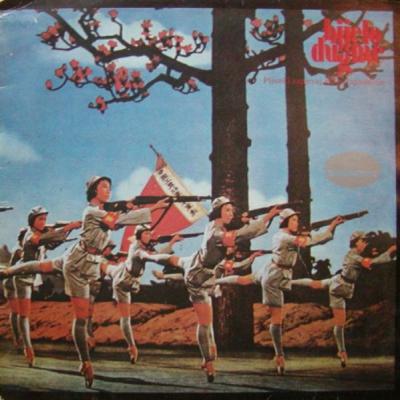
[XVI secolo, dopo il 1523?]
Canzone in lingua croata che celebra la ribellione di Hvar (Lèsina) in Dalmazia del 1510-14, quando la maggioranza croata della popolazione si ribellò alle angheria e alle vessazioni dei dominatori veneziani e della nobiltà locale. A capo della rivolta il Matija Ivanić (1445-1523) citato nella penultima strofa, un anziano cittadino molto stimato dalla popolazione.
La canzone fu rispolverata durante la seconda guerra mondiale dai partigiani jugoslavi operanti in Dalmazia. Ripresa anche dai Бијело дугме / Bijelo Dugme di Goran Bregović nell’introduzione del loro album del 1986 intitolato “Pljuni i zapjevaj moja Jugoslavijo” (“Sputa e canta, mia Jugoslavia”)
All’inizio del 400 la Repubblica di Venezia aveva riacquisito il dominio sulla Dalmazia, perso a metà 300 dopo la fine dei contrasti con il regno ungherese. Venezia aveva cancellato ogni autonomia e diritto... (continua)
Canzone in lingua croata che celebra la ribellione di Hvar (Lèsina) in Dalmazia del 1510-14, quando la maggioranza croata della popolazione si ribellò alle angheria e alle vessazioni dei dominatori veneziani e della nobiltà locale. A capo della rivolta il Matija Ivanić (1445-1523) citato nella penultima strofa, un anziano cittadino molto stimato dalla popolazione.
La canzone fu rispolverata durante la seconda guerra mondiale dai partigiani jugoslavi operanti in Dalmazia. Ripresa anche dai Бијело дугме / Bijelo Dugme di Goran Bregović nell’introduzione del loro album del 1986 intitolato “Pljuni i zapjevaj moja Jugoslavijo” (“Sputa e canta, mia Jugoslavia”)
All’inizio del 400 la Repubblica di Venezia aveva riacquisito il dominio sulla Dalmazia, perso a metà 300 dopo la fine dei contrasti con il regno ungherese. Venezia aveva cancellato ogni autonomia e diritto... (continua)
Padaj silo i nepravdo,
(continua)
(continua)
inviata da Bernart Bartleby 7/2/2014 - 09:53
Zombie

CROATO /CROATIAN
Versione croata / Croatian translation.
Fondamentalmente si tratta della versione serba "croatizzata", in quanto la "versione croata" presente su lyricstranslate.com appariva palesemente fatta col traduttore di Google.
It is basically a "Croatization" of the foregoing Serbian translation, as the "Croatian translation" available from lyricstranslate.com is clearly made by using Google translator.
Fondamentalmente si tratta della versione serba "croatizzata", in quanto la "versione croata" presente su lyricstranslate.com appariva palesemente fatta col traduttore di Google.
It is basically a "Croatization" of the foregoing Serbian translation, as the "Croatian translation" available from lyricstranslate.com is clearly made by using Google translator.
ZOMBI
(continua)
(continua)
inviata da DQ82 30/9/2013 - 09:29
Катюша

CROATO / CROAT
Versione croata da lyricstranslate.com
Croatian translation from lyricstranslate.com
Kaćuša (ili Katjuša) (rus.: Катюша) je ruska ratna pjesma o djevojci koja čezne za svojim dragim, koji je na bojišnici. Glazbu je 1938. skladao Matvej Blatner, a tekst je napisao Mihail Isakovskij. Prvi put ju je izvela slavna ruska narodna pjevačica, Lidija Ruslanova. Neki kritičari vjeruju da Kaćuša ipak nije Blatnerova skladba, ukazujući na to da se u operi Mavra (1922.) Igora Stravinskog pojavljuje slična glazbena tema koja je kasnije uklopljena u Chanson Russe (1937.)
"Kaćuša" je zapravo deminutiv iz dragosti imena Ekaterina (Katarina). U ruskom jeziku mnoga imena imaju takve deminutive (uz nadimke). Na primjer, nadimak imena Natalija je Nataša, a dodatni deminutiv je Natašenka. U slučaju Ekaterine, Katja je nadimak, a deminutiv je Kaćuša.
Po ovoj pjesmi ime su dobili i Kaćuša raketni... (continua)
Versione croata da lyricstranslate.com
Croatian translation from lyricstranslate.com
Kaćuša (ili Katjuša) (rus.: Катюша) je ruska ratna pjesma o djevojci koja čezne za svojim dragim, koji je na bojišnici. Glazbu je 1938. skladao Matvej Blatner, a tekst je napisao Mihail Isakovskij. Prvi put ju je izvela slavna ruska narodna pjevačica, Lidija Ruslanova. Neki kritičari vjeruju da Kaćuša ipak nije Blatnerova skladba, ukazujući na to da se u operi Mavra (1922.) Igora Stravinskog pojavljuje slična glazbena tema koja je kasnije uklopljena u Chanson Russe (1937.)
"Kaćuša" je zapravo deminutiv iz dragosti imena Ekaterina (Katarina). U ruskom jeziku mnoga imena imaju takve deminutive (uz nadimke). Na primjer, nadimak imena Natalija je Nataša, a dodatni deminutiv je Natašenka. U slučaju Ekaterine, Katja je nadimak, a deminutiv je Kaćuša.
Po ovoj pjesmi ime su dobili i Kaćuša raketni... (continua)
KATJUŠA
(continua)
(continua)
inviata da DoNQuijote82 21/9/2013 - 09:45
Περιμένοντας τοὺς βαρβάρους

ČEKAJUĆI BARBARE
(continua)
(continua)
inviata da Riccardo Venturi 7/11/2012 - 22:48
Todesfuge

CROATO / CROAT / CROATE / KROATIA
Versione croata di Tomislav Dretar
Hrvatska versija Tomislava Dretara
Croatian version by Tomislav Dretar
Version croate de Tomislav Dretar
Tomislav Dretarin kroatiankielinen versio
Versione croata di Tomislav Dretar
Hrvatska versija Tomislava Dretara
Croatian version by Tomislav Dretar
Version croate de Tomislav Dretar
Tomislav Dretarin kroatiankielinen versio
FUGA SMRTI
(continua)
(continua)
inviata da DonQuijote82 23/10/2011 - 16:36
Joan Baez: The Lily Of The West

USNE VRELE VIŠNJE
(continua)
(continua)
inviata da Riccardo Venturi 18/8/2009 - 20:09
Он не вернулся из боя
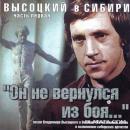
ON SE NIJE VRATIO IZ BOJA
(continua)
(continua)
inviata da Riccardo Venturi 28/5/2008 - 15:52
Gelem, gelem

6. Croato / Croat (National Anthems)
La versione completa in lingua croata, anch'essa proveniente da National Anthems.
La versione completa in lingua croata, anch'essa proveniente da National Anthems.
GELEM, GELEM
(continua)
(continua)
inviata da Riccardo Venturi 21/5/2008 - 01:20
Bella Ciao
anonimo

CROATO / CROAT 1
Bella ciao (Versione croata)
Bella ciao (Croatian version)
Tratta dal forum di National Anthems, postata dall'utente Avtandil. Non è indicato l'eventuale nome dell'autore. Si tratta di una versione letterale forse dovuta al postatore stesso.
Reproduced from the National Anthems website forum, posted by the user Avtandil. The author's name, if any, is not stated. It is a word-for-word translation maybe made by the poster himself.
Bella ciao (Versione croata)
Bella ciao (Croatian version)
Tratta dal forum di National Anthems, postata dall'utente Avtandil. Non è indicato l'eventuale nome dell'autore. Si tratta di una versione letterale forse dovuta al postatore stesso.
Reproduced from the National Anthems website forum, posted by the user Avtandil. The author's name, if any, is not stated. It is a word-for-word translation maybe made by the poster himself.
Jednoga jutra u samo svitanje,
(continua)
(continua)
inviata da Riccardo Venturi 20/5/2008 - 22:02
Warszawianka 1905 roku [Варшавянка; La Varsovienne; ¡A las barricadas!]
![Warszawianka 1905 roku [Варшавянка; La Varsovienne; ¡A las barricadas!]](img/thumb/c6506_130x140.jpeg?1328189496)
VARŠAVJANKA
(continua)
(continua)
inviata da Riccardo Venturi 13/10/2007 - 02:34
Bilečanka
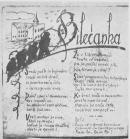
Interpretata in croato da Zoran Predin
Nell'album "Pod crveno zvezdo", 2008
BILEĆANKA
(continua)
(continua)
inviata da Riccardo Venturi 21/1/2007 - 21:33
Joan of Arc
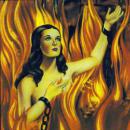
Glazba i stihovi: Leonard Cohen
Hrvatski prepjevi: Srđan Depolo
Transkripcija Tomislav Šakić
Hrvatski prepjevi: Srđan Depolo
Transkripcija Tomislav Šakić
IVANA ORLEANSKA
(continua)
(continua)
inviata da Adriana 31/12/2006 - 14:48
Leonard Cohen: Bird On The Wire
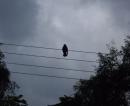
Glazba i stihovi: Leonard Cohen
Hrvatski prepjevi: Srđan Depolo
Transkripcija Tomislav Šakić
Hrvatski prepjevi: Srđan Depolo
Transkripcija Tomislav Šakić
PTICA DUGIM LETOM
(continua)
(continua)
inviata da Adriana e Riccardo 31/12/2006 - 14:43
Why

Questa canzone e' stata scritta durante la guerra in Croazia.
Ecco la traduzione in croato.
Ecco la traduzione in croato.
ZAŠTO
(continua)
(continua)
inviata da Kheoma 25/12/2006 - 17:13
Mir do neba
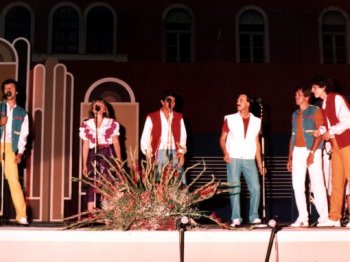
[1991]
Album: Da mi te zaljubit u mene
(anche in Moja domovina - Kompilacija)
Canzone composta dalla Grupa Magazin l'anno stesso dell'inizio delle guerre jugoslave (1991).
Album: Da mi te zaljubit u mene
(anche in Moja domovina - Kompilacija)
Canzone composta dalla Grupa Magazin l'anno stesso dell'inizio delle guerre jugoslave (1991).
Mir, Mir do neba,
(continua)
(continua)
inviata da Monia 15/8/2006 - 12:44
Percorsi:
Guerre nei Balcani negli anni '90
Libera nos Domine
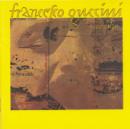
La traduzione, tra le prime di questo sito, è stata sottoposta a totale revisione il 9.1.2015 [CCG/AWS Staff]
LIBERA NOS DOMINE
(continua)
(continua)
15/4/2006 - 20:11
Where Have all the Flowers Gone

CROATO / CROATIAN / CROATE [1]
Monia Verardi
Monia Verardi
Versione croata di Monia Verardi
Croatian version by Monia Verardi
Version croate de Monia Verardi
Croatian version by Monia Verardi
Version croate de Monia Verardi
KAMO JE CVIJEĆE OTIŠLO?
(continua)
(continua)
15/4/2006 - 20:01
Vesna [Ratna pjesma]
![Vesna [Ratna pjesma]](img/upl/kudilege.jpg)
[1986]
Testo e musica / Lyrics and Music / Paroles et musique / Sanat ja sävel:
Branko Črnac Tusta
Saša Milovanović (Sale Veruda)
Davor Zgrabljić (Bucolini)
Dejo
Album: Legendarni u živo ee. aa.
Testo e musica / Lyrics and Music / Paroles et musique / Sanat ja sävel:
Branko Črnac Tusta
Saša Milovanović (Sale Veruda)
Davor Zgrabljić (Bucolini)
Dejo
Album: Legendarni u živo ee. aa.
Prolaze mi ispred nosa
(continua)
(continua)
inviata da Riccardo Venturi 12/1/2006 - 18:41
Rat
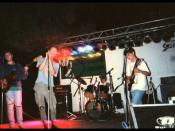
Canzone il cui titolo significa "Guerra" (o "La guerra"). Verrà inserita una traduzione non appena possibile.
Testo ripreso da:
http://www.tekstovi.com/5952/ateisti/r...
Testo ripreso da:
http://www.tekstovi.com/5952/ateisti/r...
Bio je rat, bile su sjene
(continua)
(continua)
inviata da Riccardo Venturi 12/1/2006 - 18:12
La Geste de Sarajevo

Vorrei ringraziare Riccardo Venturi per la sua traduzione in italiano che mi ha aiutato molto.
JUNAČKI DJELOVI SARAJEVA
(continua)
(continua)
inviata da Monia 6/9/2005 - 20:44
Majko mila, Majko draga
anonimo
In 1991, armed intervention began in the Republic of Croatia by the Yugoslav People's Army which very soon turned into outright war, with many victims and severe devastation. New songs were born in such circumstances. In Croatia, old traditional religious songs were adapted to the situation, particularly those in which the Mother of God was asked for help and protection from the tribulations of the war. One of them, Majko mila, Majko draga (Sweet Mother, Dear Mother) stands out with its clear message.
The direct way in which the text of this song reflects the state of war in Croatia in the autumn and spring of 1991 calls for the presentation of all the verses of that text. [The second] verse is given in two versions, the first (a) as it was sung in Zagreb, and the second (b) as it was sung in Nova Kapela [a town near to the war zone around Nova Gradiška] - which is an indicator of the current... (continua)
The direct way in which the text of this song reflects the state of war in Croatia in the autumn and spring of 1991 calls for the presentation of all the verses of that text. [The second] verse is given in two versions, the first (a) as it was sung in Zagreb, and the second (b) as it was sung in Nova Kapela [a town near to the war zone around Nova Gradiška] - which is an indicator of the current... (continua)
Dom nam čuvaj Božja Mati,
(continua)
(continua)
5/8/2005 - 21:46
Percorsi:
Guerre nei Balcani negli anni '90
Ima jedna duga cesta
anonimo
[This religious song] was sung in Zagreb at the beginning of the 1980s.
Although there should be no serious obstacles to finding the name of the author of the text and the tune of that song, as for any other popular song - Croatian or non-Croatian - the writer still has not been succesful in so doing. In any case, the text speaks of peace and love, just what people yearn for, and is sung to an emotional, even somewhat sentimental, melody and there were good reasons for its ready general acceptance.
Some years later, in the first half of 1990, when units of what was then the Yugoslav People's Army tried to enter Western Herzegovina, which is inhabited by ethnic Croatian, television journalists shot impressive scenes in which the local people blocked the way of the advancing army with a living wall made up of their bodies. Women were particularly in evidence, singing that very song about... (continua)
Although there should be no serious obstacles to finding the name of the author of the text and the tune of that song, as for any other popular song - Croatian or non-Croatian - the writer still has not been succesful in so doing. In any case, the text speaks of peace and love, just what people yearn for, and is sung to an emotional, even somewhat sentimental, melody and there were good reasons for its ready general acceptance.
Some years later, in the first half of 1990, when units of what was then the Yugoslav People's Army tried to enter Western Herzegovina, which is inhabited by ethnic Croatian, television journalists shot impressive scenes in which the local people blocked the way of the advancing army with a living wall made up of their bodies. Women were particularly in evidence, singing that very song about... (continua)
Ima jedna duga cesta
(continua)
(continua)
5/8/2005 - 00:26
Percorsi:
Guerre nei Balcani negli anni '90
Where Have all the Flowers Gone

CROATO/CROATIAN/CROATE [2]
Najbolji Hrvatski Tamburaši [Zlatni Dukati]
Versione croata dei Najbolji Hrvatski Tamburaši (Zlatni Dukati)
Croatian version by Najbolji Hrvatski Tamburaši (Zlatni Dukati)
Version croate des Najbolji Hrvatski Tamburaši (Zlatni Dukati)
Sulla funzione delle canzoni "apparentemente pacifiste" in Croazia durante la guerra degli anni '90 si veda il commento a Lili Marleen in croato. La versione è del 1991 (lo stesso anno dello scoppio delle guerre jugoslave) e fu per la prima volta eseguita dal gruppo ancora con il nome di "Zlatni Dukati".
On the meaning and function of the so-called "pacifist songs" in Croatia during the wars of the 90s see the note to the croatian version of Lili Marleen. The version was composed in 1991 (the same year the Yugoslavian wars broke out) and was first performed by the band then bearing the name of "Zlatni Dukati".
Sur la fonction... (continua)
Najbolji Hrvatski Tamburaši [Zlatni Dukati]
Versione croata dei Najbolji Hrvatski Tamburaši (Zlatni Dukati)
Croatian version by Najbolji Hrvatski Tamburaši (Zlatni Dukati)
Version croate des Najbolji Hrvatski Tamburaši (Zlatni Dukati)
Sulla funzione delle canzoni "apparentemente pacifiste" in Croazia durante la guerra degli anni '90 si veda il commento a Lili Marleen in croato. La versione è del 1991 (lo stesso anno dello scoppio delle guerre jugoslave) e fu per la prima volta eseguita dal gruppo ancora con il nome di "Zlatni Dukati".
On the meaning and function of the so-called "pacifist songs" in Croatia during the wars of the 90s see the note to the croatian version of Lili Marleen. The version was composed in 1991 (the same year the Yugoslavian wars broke out) and was first performed by the band then bearing the name of "Zlatni Dukati".
Sur la fonction... (continua)
IZNAD POLJA MAKOVA
(continua)
(continua)
inviata da Monia 4/8/2005 - 01:19
×
![]()



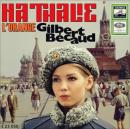



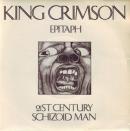

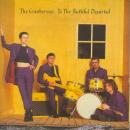


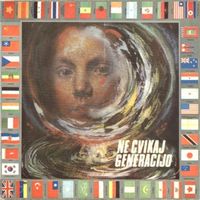
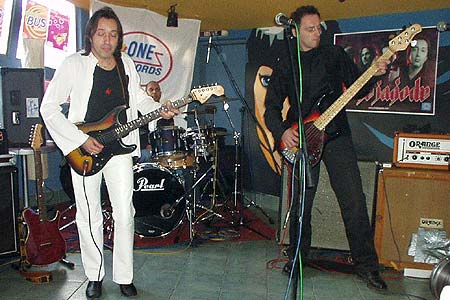


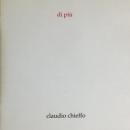
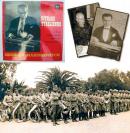
Jenny Morningstar (L. Trans.)